The opening ceremony for a conference marking the 10th anniversary of the participation of the police in international peacekeeping missions was held on 27 November 2007 at the Police Academy in Tacen. The opening speech was delivered by Deputy Police Director General Matjaž Šinkovec, while the keynote speech was reserved for Interior Ministry State Secretary, Zvonko Zinrajh.
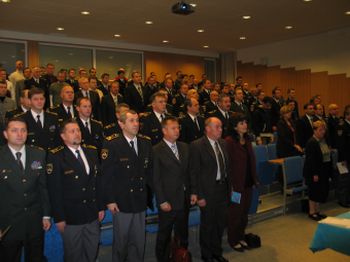 The opening of the conference
The opening of the conference
Deputy Police Director General Matjaž Šinkovec said on the occasion: "Representing the country and its police force in the international environment is a special honour and a very responsible task. The first Slovenian police officer to trail-blazed this path was Zvonko Zinrajh, who is today a State Secretary at the Interior Ministry. Ten years after the first activities gan, I can say with certainty that the Slovenian police have boosted their reputation, also in foreign countries, during those years. The police have gained great experience and great respect around the world."
"Although the Slovenian police started participating in peacekeeping missions ten years ago, practically out of nothing, and our contribution in the world was very modest and only symbolic, we managed with time to create an effective and self-sufficient concept which was interesting also for colleagues from ranking organisations in foreign countries."
"A special recognition, as the first one, goes to Anton Pozvek, who was responsible for the area of co-called police specialties and was deployed abroad to be trained to work in observer missions of the Western European Union. After he returned to Slovenia, he prepared an organiser of activities, which included the entire programme for preparing and training for the work in the mission, determined the sets of uniforms and equipment and vehicles for the work in the mission, prescribed health examinations and mandatory vaccinations, the preparation of documents on the deployment, and the salaries of soldiers for the work in missions, a draft of the contracts for the work abroad, acquisition of adequate travel documents, provision of additional health and accident insurance in crisis hit areas, and other matters necessary for normal work in missions."
"Later, he also prepared an initiative for the further participation of the Slovenian police in international missions, which was then confirmed in the same year. He kept his role of initiator and coordinator of police activities in this area until the establishment of a special department for peacekeeping missions at the Uniformed Police Administration, and was closely connected to police peacekeeping missions until his retirement.!
"Anyone who thinks that the local environment does not recognise the contribution of peacekeeping police officers is wrong. We are aware that one can do the most for the interests of a country by adding a personal touch to expertise and professionalism. And we have recognised this in you. We are sincerely grateful to all of you who have enriched our collective work with your experience and to those who later took over the role of coordinators of the activities of the Slovenian police in this area.!
"You and your work was also recognised by other Slovenian institutions, such as the Slovenian Armed Forces and the Ministry of Defence, the Ministry of Foreign Affairs, educational institutions and others, also in foreign countries. The fact that foreign police forces frequently express their wish to cooperate with Slovenian police officers says a lot about your quality, expertise and professionalism, about your ability to adapt to different profession groups, different environments, foreign cultures, and, above all, the most complicated security situations. This, therefore, speaks about the ability to follow the goals of the national security policy, which favours non-violent settlement of disputes, and condemns the use of violence, in the best possible way."
"These are only some among the numerous reasons police officers who participate or participated in peacekeeping missions are especially appreciated, both at home and abroad. I dare to claim that you have the greatest possible support here at home, and not only conceptual support, but also concrete support. Moreover, in the mission in Albania, such a good foundation has enabled you to participate under the auspices of the United Nations, the European Union, the Organisation for Security and Co-operation in Europe (OSCE) or as part of multilateral missions also in Afghanistan, Bosnia-Herzegovina, Jordan, Kosovo, Macedonia, Serbia and even in Timor-Leste."
"Besides the first mission, which showed that the Slovenian police is adequately trained and sufficiently and adequately equipped for participating in various missions, two missions deserve special mention. The first is to Timor-Leste, which was not only the first non-European mission, it was also very remote and in completely different geographical conditions. It required the development of special police equipment. The mission to Kosovo, on the other hand, stands out by the number of participants in one contingent."
"Because you were present the most in the areas all of us know well - because they used to be a part of common framework - you are even more appreciated because of your familiarity with the situation, and because you probably understand the developments characteristic of the concrete environment more than anyone else. By doing so, you also managed to remain unbiased, which is one of the key guidelines of international missions."
"While it is true that serving in an international mission is easier today than it used to be in the beginnings, now that paths have been marked and experience gained, those police officers who currently serve in international missions also have a tough job because of the increasingly complex security situation. The nature of work has changed considerably in all these years. Today, when substantial activities of the work in an international mission are becoming increasingly emphasised, the qualities I listed are even more important. Therefore, it is not easier or harder, it is different. A common guideline remains - the tendency for the peaceful co-creation of conditions which would as soon as possible provide a balance acceptable to all sides."
"Anyhow, your preparedness is the first step towards participation in future missions, in which the Slovenian police will most certainly leave its mark."
"Slovenia is today an important subject in international relations also thanks to you. Your contribution has made us fully realise the co-responsibility of our country for providing peace in the world, and the commitment we have accepted with membership in the most respected international organisations."
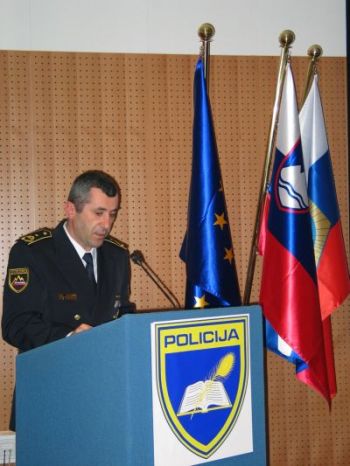 Deputy Police Director General Matjaž Šinkovec
Deputy Police Director General Matjaž Šinkovec
The next to deliver a speech was the State Secretary at the Ministry of the Interior, Zvonko Zinrajh, who also participated with an article entitled Deployment of the first Slovenian police officer in the mission of the Western European Union to Albania (MAPE) - first experience.
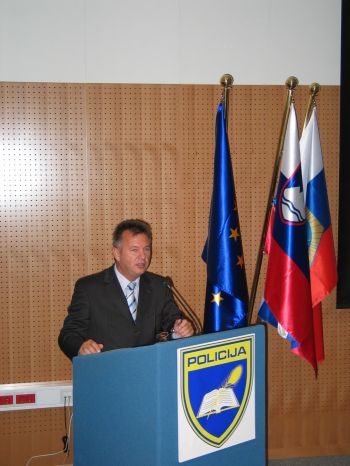 State Secretary at the Ministry of the Interior Zvonko Zinrajh
State Secretary at the Ministry of the Interior Zvonko Zinrajh
A panel discussion, Slovenian police in international civilian missions - ten years after, was chaired by the head of the department for international peacekeeping operations at the Uniformed Police Administration, Boris Kankaraš, and Professor Ljubica Jelušič from the Faculty of Social Sciences at Ljubljana University, who at the end presented a study on the participation of the Slovenian police in crisis response operations.
Also presenting their articles at the panel were:
- Prof. Danilo Tűrk, PhD, the head of the international law department of the Ljubljana Faculty of Law, with the article A view of the UN on police operations in peacekeeping missions;
- Ambassador Matjaž Kovačič with the article Implementation of policy of deployment of civilians to international missions and international organisations;
- Klemen Grošelj, PhD, from the Faculty of Social Sciences of the Ljubljana University, with the article Importance of civilian capacities in crisis response operations;
- Anton Pozvek, a retired police official, with the article Beginnings of peacekeeping missions of the Slovenian police;
- Darko Lesjak from the Uniformed Police Department at the General Police Department, with the article Slovenian police in international civilian missions - ten years after;
- Alan Geder from the Slovenian Armed Forces with the article Experience of the Slovenian Armed Forces in crisis response operations;
- Janez Rupar, a representative of the Slovenian police in the police unit organised within the Council of the European Union, with the article The Council of the European Union and peace-supporting police operations and
- Boštjan Videmšek, a journalist of daily newspaper Delo, with the article Police officers in crisis response operations as an element Slovenia's image in the world - a media view.
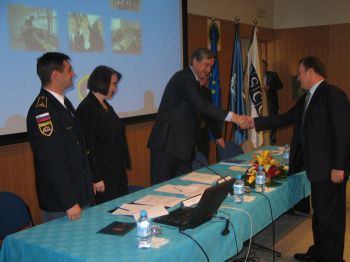 Professor and newly-elected Slovenian president, Prof. Danilo Tűrk, PhD, greeted by Ambassador Matjaž Kovačič, among others.
Professor and newly-elected Slovenian president, Prof. Danilo Tűrk, PhD, greeted by Ambassador Matjaž Kovačič, among others.
Standing on the left: Boris Kankaraš and Ljubica Jelušič
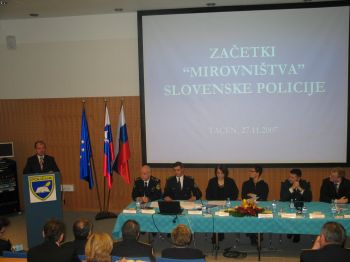 Anton Pozvek presenting his article
Anton Pozvek presenting his article
The anniversary of peacekeeping missions of the Slovenian police was also marked with an exhibition of photos by police peacekeepers at the headquarters of the Police Academy, and the publication of a brochure: Slovenian Police in International Civilian Missions
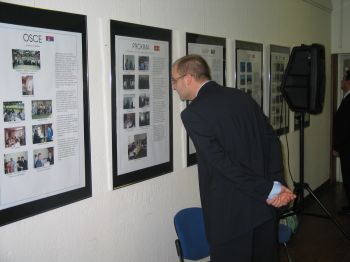 Visitors at the exhibition
Visitors at the exhibition
A quartet from the Police Orchestra played at the opening of the conference and the exhibition.

